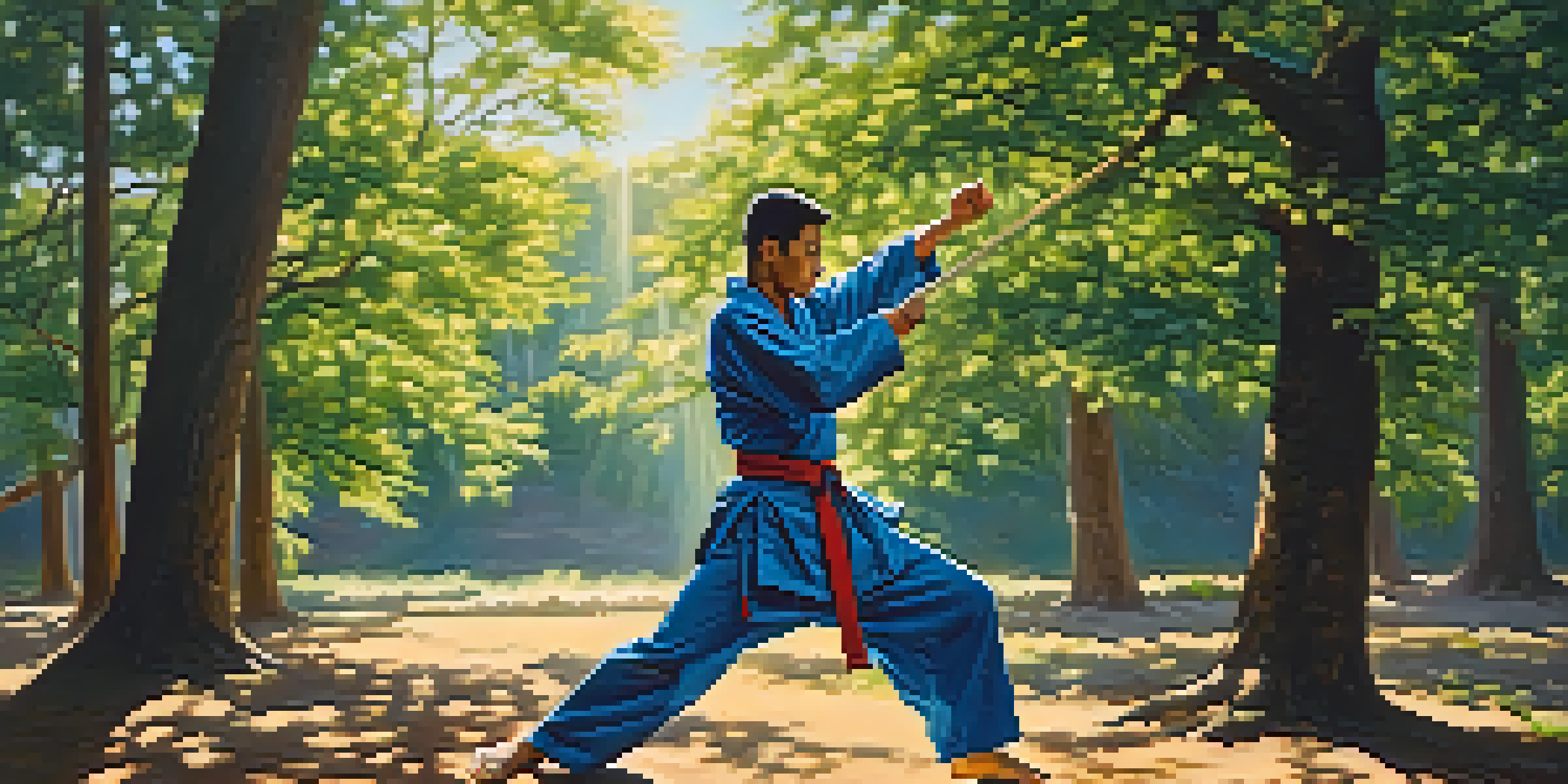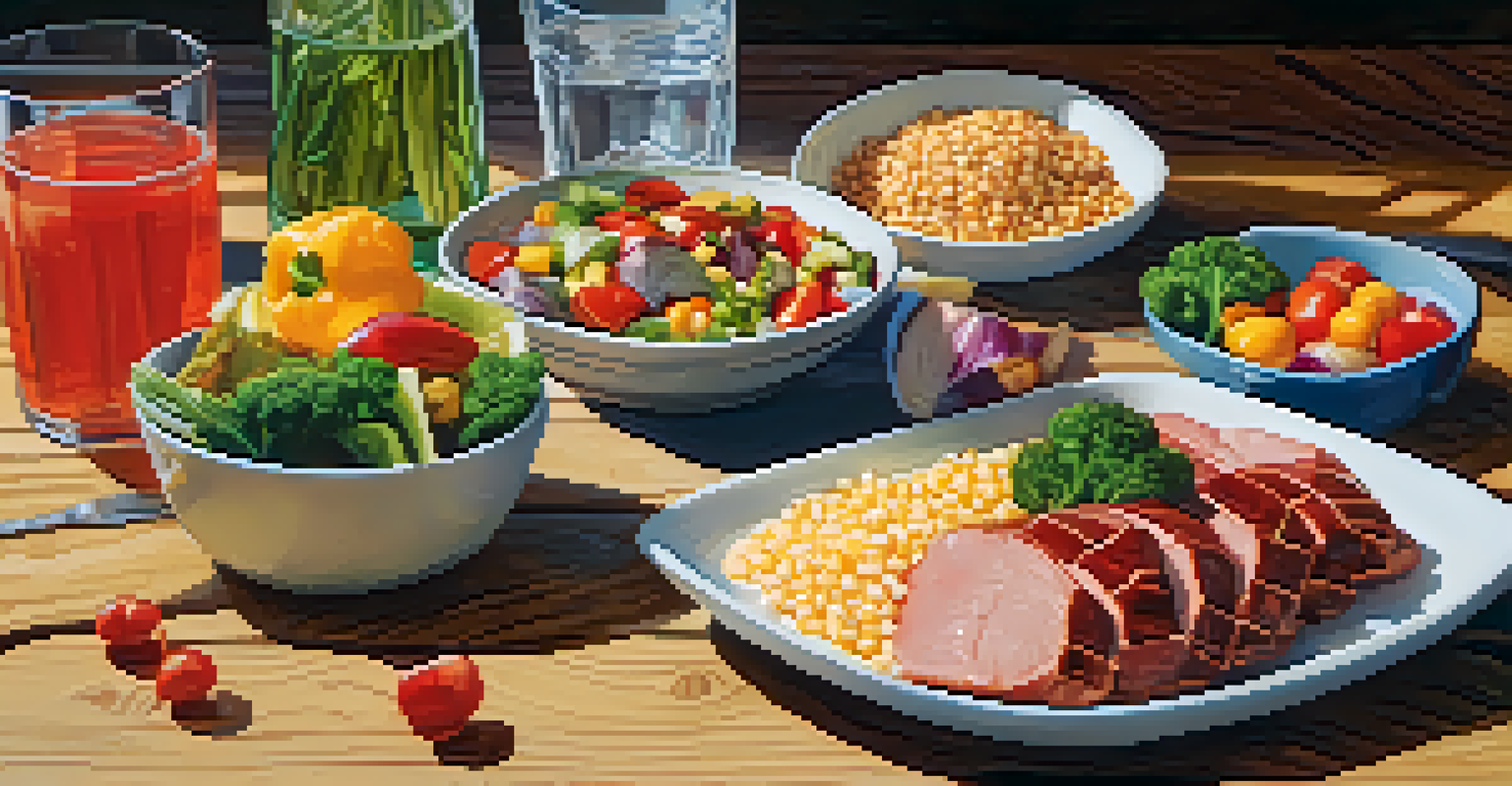The Impact of Nutrition on Injury Prevention in Martial Arts

Understanding the Link Between Nutrition and Performance
Nutrition is the foundation of any athlete's performance, including martial artists. A well-balanced diet fuels the body, ensuring that energy levels remain high during training and competitions. When martial artists consume the right nutrients, they not only enhance their strength and endurance but also improve their overall resilience to injuries.
You are what you eat, so don't be fast, cheap, easy, or fake.
Think of nutrition as the oil that keeps a well-tuned engine running smoothly. Without proper fuel, the engine can sputter, leading to breakdowns, much like how poorly nourished athletes can face fatigue and injuries. Thus, understanding the impact of nutrition is essential for martial artists aiming for peak performance.
For martial artists, this means focusing on macronutrients like carbohydrates, proteins, and fats, along with essential vitamins and minerals. Each plays a unique role in muscle recovery, energy production, and immune function, which are all critical for preventing injuries.
Essential Nutrients for Injury Prevention
Certain nutrients are especially vital for injury prevention in martial arts. For instance, proteins are crucial for muscle repair and growth, while complex carbohydrates provide sustained energy. Additionally, healthy fats support joint health, which is often put under stress during intense training sessions.

Vitamins and minerals, such as Vitamin D and calcium, are also important for bone health and muscle function. A deficiency in these nutrients can lead to weakened bones and increased risk of fractures. Therefore, martial artists should prioritize a varied diet rich in these essential nutrients to maintain their physical integrity.
Nutrition Fuels Athletic Performance
A well-balanced diet is essential for martial artists, enhancing strength, endurance, and injury resilience.
Incorporating foods like lean meats, whole grains, and leafy greens can create a balanced diet that supports both performance and recovery. This way, martial artists can ensure they have the right building blocks to keep injuries at bay.
Hydration: A Key Component of Nutrition
Hydration is often overlooked but plays a critical role in injury prevention. Dehydration can lead to decreased performance, increased fatigue, and a higher risk of muscle cramps—all of which can contribute to injuries. Martial artists should make it a habit to drink water before, during, and after training.
Good nutrition creates health in all areas of our existence. All parts are interconnected.
Imagine your body as a sponge; when it's hydrated, it functions optimally, absorbing shock and reducing the risk of injury. On the flip side, a dry sponge becomes brittle and prone to cracking, just like how dehydrated muscles can lead to strains and tears.
In addition to water, electrolyte-rich beverages can help replenish lost minerals during intense training. By prioritizing hydration, martial artists can enhance their performance and protect themselves from avoidable injuries.
Meal Timing: Fueling for Performance and Recovery
The timing of meals plays a significant role in how martial artists fuel their bodies for performance and recovery. Consuming a balanced meal or snack before training can provide the necessary energy to power through intense sessions. Similarly, post-workout nutrition is crucial for recovery and muscle repair.
Think of meal timing as a strategic play in a martial arts match. Just as a well-timed move can turn the tide in your favor, eating at the right times can enhance your training outcomes. For instance, a meal rich in protein and carbohydrates within 30 minutes after a workout can significantly aid recovery.
Hydration Prevents Injuries
Proper hydration is crucial for maintaining performance and reducing the risk of muscle cramps and injuries.
Creating a meal schedule that aligns with training sessions helps martial artists optimize their performance and minimize injury risks. Planning meals around training can make a noticeable difference in overall well-being and physical readiness.
The Role of Supplements in Martial Arts Nutrition
Supplements can complement a martial artist's diet, especially when there are gaps in nutrient intake. For instance, protein powders can help meet daily protein requirements, while omega-3 fatty acids can support joint health and reduce inflammation. However, it's essential to approach supplementation wisely.
Think of supplements as the icing on the cake—helpful but not essential if the cake itself is well-made. Relying solely on supplements without a solid nutritional foundation can lead to imbalances and health issues. Therefore, they should be used to enhance, not replace, a healthy diet.
Before incorporating any supplements, martial artists should consult with a nutritionist or healthcare provider to ensure they align with their specific needs and goals. This personalized approach helps in making informed choices that contribute to injury prevention.
Mental Focus: Nutrition's Impact on Cognitive Function
Nutrition doesn’t just affect the body; it also influences mental focus and cognitive function, which are crucial in martial arts. A well-nourished brain can improve reaction times, decision-making, and overall mental clarity during training and competitions. Foods rich in antioxidants, omega-3 fatty acids, and vitamins can boost brain health.
Picture a martial artist in the heat of a match; their ability to think quickly and react can determine the outcome. If their nutrition is lacking, their cognitive functions may suffer, leading to poor performance and increased risk of injury. Thus, a balanced diet is vital for maintaining both physical and mental agility.
Personalized Plans Boost Results
Creating a tailored nutrition plan based on individual needs helps martial artists optimize their health and performance.
Incorporating foods like fatty fish, nuts, and berries can support cognitive health. Martial artists should recognize that their nutrition can significantly influence their mental sharpness, which in turn affects their ability to stay injury-free.
Creating a Personalized Nutrition Plan for Martial Artists
Every martial artist is unique, and so is their nutritional needs. Factors such as age, body type, training intensity, and personal goals should all be considered when crafting a nutrition plan. A personalized approach ensures that martial artists receive the right balance of nutrients to support their specific requirements.
Think of a nutrition plan as a tailored suit; it should fit perfectly to support optimal performance. A one-size-fits-all approach can lead to deficiencies or excesses that may hinder progress and increase injury risk. Therefore, working with a nutritionist can help in creating a bespoke plan that aligns with individual needs.

Regularly reassessing and adjusting the nutrition plan is also crucial as training demands change. By staying proactive about their nutrition, martial artists can maintain their health, performance, and ultimately, their safety.